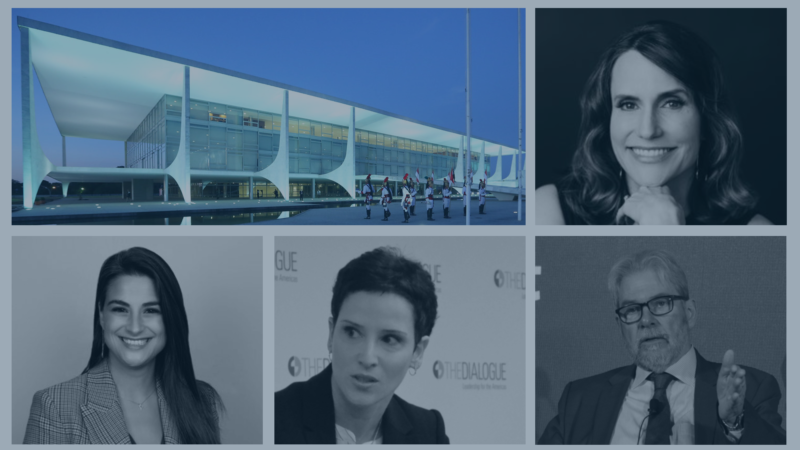Rising Brazil: The Choices Of A New Global Power
What should we expect from a newly powerful Brazil? Does the country have the capacity and leadership to be a central actor in addressing critical global and regional problems?
Luiz Inácio “Lula” da Silva narrowly defeated his populist, right-wing opponent Jair Bolsonaro by just over 2 million votes in the second round of elections and will begin his third term as president of Brazil in January 2023. To explore what the election means for Brazilian politics, society, and foreign relations, the Inter-American Dialogue hosted an event titled “Brazil Elections – What’s Next?” on November 7, 2022. Rebecca Bill Chavez, president and CEO of the Dialogue and moderator of the event, framed the discussion with three questions: 1) What is the likelihood of a peaceful transition of power given Bolsonaro’s unsubstantiated claims that Brazil’s electronic voting system is vulnerable to fraud? 2) What will Lula prioritize, and how will these policy priorities differ from those of his first two terms in office? and 3) What obstacles will Lula face as he pursues his policy agenda, including economic constraints and the composition of Brazil’s powerful legislative branch?
Monica de Bolle, senior fellow at the Peterson Institute for International Economics (PIIE) and Dialogue member, observed that while there have been protests, truck blockades of major roads, as well as a lack of a concession from Bolsonaro, there has been little to no evidence of electoral fraud. The election has already been certified, the administration transition is already in progress, and Bolsonaro has no real judicial recourse to challenge the election results. According to de Bolle, Lula will have to confront increasing poverty levels, hunger, and childhood malnutrition rates. At the same time, he is entering into office alongside a right-leaning Congress as well as a spending cap that did not exist during his last term in office. This spending cap can be removed but is most likely to require a constitutional amendment that would require two-thirds of Congressional support to pass. De Bolle highlighted Brazil’s potential to re-enter the world stage after four years of being treated as a global pariah, particularly in the areas of climate, deforestation, and the environment.
Michael Reid, “Bello” columnist and senior editor for Latin America and Spain at The Economist, brought attention to the narrowness of the election and pointed to anti-Partido de Trabalhadores (PT) sentiment stemming from corruption scandals, PT economic mismanagement under President Rousseff, and President Bolsonaro’s tripling of emergency social payments as the main reasons for such a narrow margin of victory. Despite the closeness of the election, Reid recognized the results as a defeat for identity politics and predicted Bolsonaro’s power will be blunted in the years to come. Reid expects the Lula administration will govern from the center and rebuild institutional control over environmental, scientific, and educational issues.
Addressing the large amounts of disinformation disseminated during the elections, Roberta Braga, counter-disinformation director at Equis Research, framed the proliferation of fake news within the broader context of a “crisis of trust.” In a constantly changing media environment, citizen trust in traditional information sources has decreased, local journalism outlets have been dismantled, and individuals are oversaturated with one-sided online content. In Brazil, this crisis of trust is compounded by the presence of corruption, crime and violence, and the Covid-19 pandemic. Despite the isolation of Bolsonaro supporters within separate media “bubbles,” Braga praised the efforts of fact-checkers and verification systems throughout Brazil during the 2022 cycle. Braga concluded by stressing the importance of filling information “voids” as opposed to engaging with disinformation directly.
During the Q&A portion of the event, panelists addressed several challenges that the Lula administration will face in the areas of international politics, public health, youth and civic engagement, as well as corruption. Panelists identified opportunities for the Lula administration to bridge the left-leaning anti-incumbency movement in Latin America with the rest of the region, to provide Brazil with a political antidote to stop democratic backsliding through a centrist coalition, and to lead climate-responsive anti-viral and infectious disease research. Looking forward, the panel concluded that Brazilian society will need to contend with the growing role of social media platforms, a fading memory of the dictatorship, and the politicization of anti-corruption movements.
What should we expect from a newly powerful Brazil? Does the country have the capacity and leadership to be a central actor in addressing critical global and regional problems?
By all accounts, Spain wants to bring change to the European Union’s Cuba policy. In so doing, it is tackling a foreign policy challenge that often sheds more heat than light.
When Haiti was struck by a devastating earthquake, the administration of U.S. President Barack Obama quickly absorbed the depth of the tragedy and necessity of a robust U.S. response. Unless the U.S. adopts a proactive role, Haiti’s fragmented political landscape threatens to deteriorate into a political vacuum that will compound the current crisis.
 Featured Image - Romério Cunha / CC 2.0
Featured Image - Romério Cunha / CC 2.0